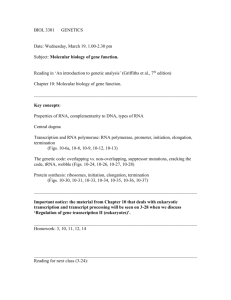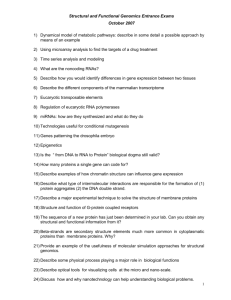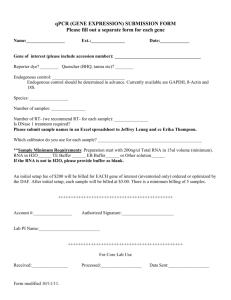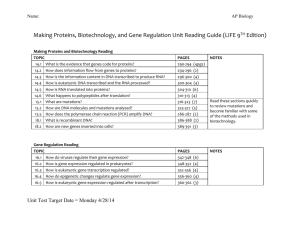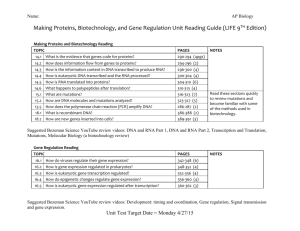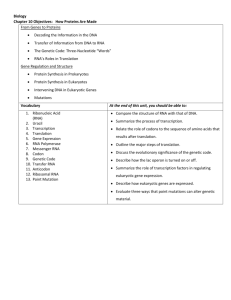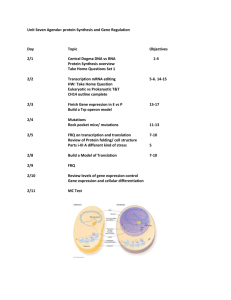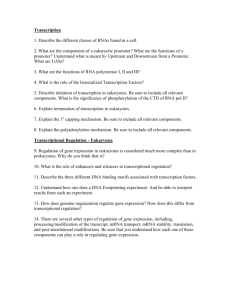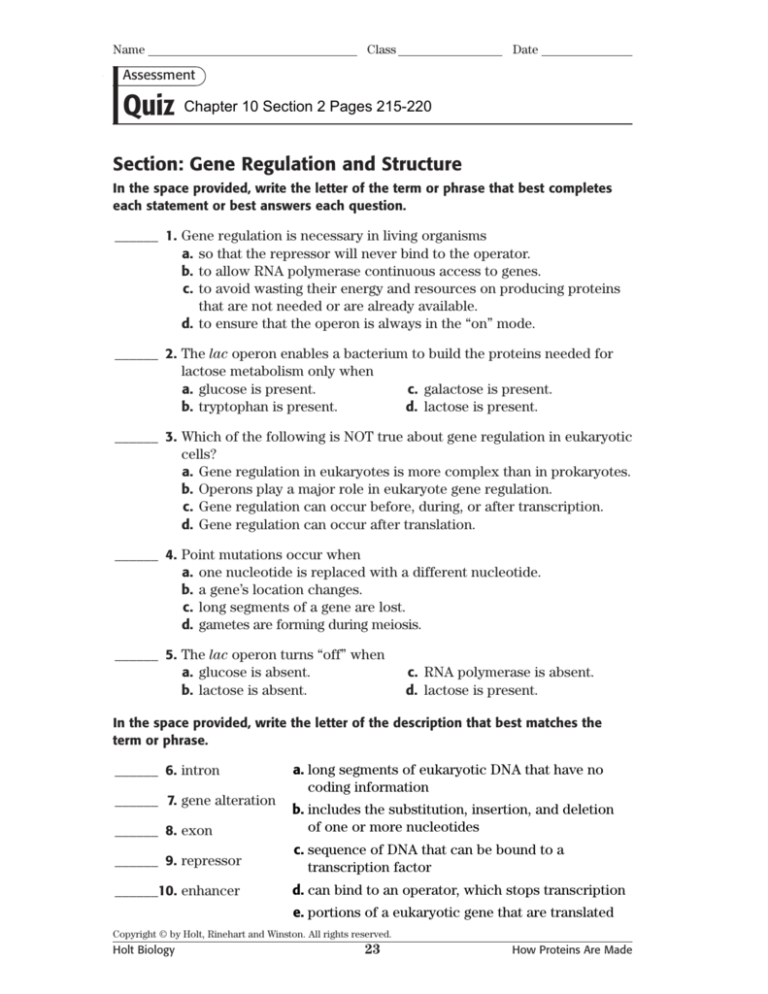
Name
Class
Date
Assessment
Quiz
Chapter 10 Section 2 Pages 215-220
Section: Gene Regulation and Structure
In the space provided, write the letter of the term or phrase that best completes
each statement or best answers each question.
______ 1. Gene regulation is necessary in living organisms
a. so that the repressor will never bind to the operator.
b. to allow RNA polymerase continuous access to genes.
c. to avoid wasting their energy and resources on producing proteins
that are not needed or are already available.
d. to ensure that the operon is always in the “on” mode.
______ 2. The lac operon enables a bacterium to build the proteins needed for
lactose metabolism only when
a. glucose is present.
c. galactose is present.
b. tryptophan is present.
d. lactose is present.
______ 3. Which of the following is NOT true about gene regulation in eukaryotic
cells?
a. Gene regulation in eukaryotes is more complex than in prokaryotes.
b. Operons play a major role in eukaryote gene regulation.
c. Gene regulation can occur before, during, or after transcription.
d. Gene regulation can occur after translation.
______ 4. Point mutations occur when
a. one nucleotide is replaced with a different nucleotide.
b. a gene’s location changes.
c. long segments of a gene are lost.
d. gametes are forming during meiosis.
______ 5. The lac operon turns “off” when
a. glucose is absent.
b. lactose is absent.
c. RNA polymerase is absent.
d. lactose is present.
In the space provided, write the letter of the description that best matches the
term or phrase.
______ 6. intron
______ 7. gene alteration
a. long segments of eukaryotic DNA that have no
coding information
______ 8. exon
b. includes the substitution, insertion, and deletion
of one or more nucleotides
______ 9. repressor
c. sequence of DNA that can be bound to a
transcription factor
______10. enhancer
d. can bind to an operator, which stops transcription
e. portions of a eukaryotic gene that are translated
Copyright © by Holt, Rinehart and Winston. All rights reserved.
Holt Biology
23
How Proteins Are Made
Name
Class
Date
Skills Worksheet
Vocabulary Review
Chapter 10 Pages 208-220
Complete the crossword puzzle using the clues provided.
ACROSS
7. a three-nucleotide sequence on a
tRNA that is complementary to one
of the codons of the genetic code
1. Like DNA,
acid (RNA) is a
molecule made of nucleotides
linked together.
8. RNA molecules that are part of the
structure of ribosomes are called
RNA.
2. RNA
is an enzyme involved
in transcription.
9. RNA molecules that temporarily
carry a specific amino acid on one
end are called
RNA.
3. The type of RNA that carries the
instructions for making a protein
from a gene to the site of translation is called
RNA.
11. The
code specifies the
amino acids and “start” and “stop”
signals with their codon.
4. The entire process by which proteins are made is called
expression.
13. collective name for a group of
genes involved in the same function, their promoter site, and their
operator
6. process for transferring a gene’s
instructions for making a protein
to an mRNA molecule
10. a three-nucleotide
sequence on the mRNA
that specifies an amino
acid or “start” or “stop”
signal
12. piece of DNA that serves
as an on-off switch for
transcription
14. long segment of nucleotides on a eukaryotic
gene that has no coding
information
1
2
3
6
4
7
8
5
9
10
DOWN
1. a protein that binds to an
operator and inhibits
transcription
11
12
13
5. portion of a eukaryotic
gene that is translated
6. a process that puts
together the amino acids
that make up a protein
14
Copyright © by Holt, Rinehart and Winston. All rights reserved.
Holt Biology
9
How Proteins Are Made

